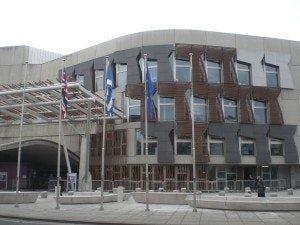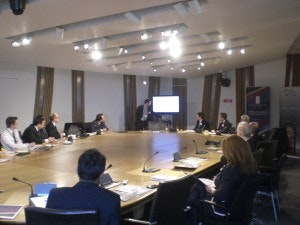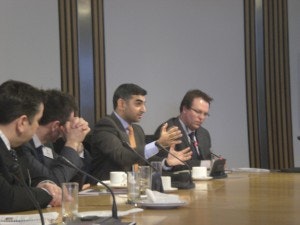Positive Money at Ethical Finance meeting in Scottish Parliament

Report of Ethical Finance meeting in Scottish Parliament by the James Gibb Stuart Trust

Scottish Parliament, Thursday 21 February 2013:
This event was organised by the Islamic Finance Council and Tods Murray LLP Solicitors as part of its continuing series of “Ethical Finance Round Tables”.
Ken Macintosh MSP, the Labour Shadow Cabinet Secretary for Finance, Employment and Sustainable Growth hosted the event and opened the proceedings. Ethical finance, he said, touches on many issues which are debated in Holyrood, including for example, tax transparency issues and questions about the availability of credit.
There were 21 people around the main table including the MSPs John Wilson (SNP) and Anne McTaggart (Labour) with an additional 6 Parliamentary Assistants in attendance.
Mr Macintosh handed over to Graham Burnside, the Chairman and Head of Banking and Finance at Tods Murray, who chaired the proceedings.
He described the Islamic Finance Council as a not-for-profit company whose purpose is to promote education on Islamic finance, and the potential role for Scotland in the ethical finance field. It provides a consultancy role for government and regulatory bodies throughout the world who are looking at this matter. It also has an educational role for scholars who are looking to enhance their knowledge of Islamic banking. In addition it has a role to play within the wider ethical finance community in order to promote dialogue and synergy between the various players in the sector.

Ben Dyson, of Positive Money, was the first to present, and he started with the question, “Where does money actually come from?” He pointed out that creating bank notes is forbidden by the Bank Charter Act of 1844, which still applies today.
But since 97% of our money is digital, created by the banks out of nothing, this means that 97% of our money is not covered by any law!
Positive Money focuses on helping people to understand the money system and its consequences. One of which, from an ethical point of view, is that they create too much money which can often go into the wrong areas of our economy. For example, 40% goes into housing, and 37% into the financial sector. Banks only lend about a tenth to non-financial businesses.
Money is created as a debt, and this makes it difficult to stimulate a recovery after a financial crisis. Under the present system, we rely upon people going into debt to provide money to the economy. More money means more debt. Less debt means less money.
The answer for a sustainable recovery is less debt and more money, but that is impossible under the present system.
As an example of how much money the banks create, Ben showed figures which indicated that in one month, June 2007, the banking sector in the UK created 4 billion pounds. In July 2007 it created 7 billion, and in September of that year it created an astonishing 16 billion. The point is that money is being created all the time, every time someone takes out a loan. We need to remove this inflationary, and unethical power, from the banks, it was suggested.
A very engaged question and answer session followed:
One person wondered if making the banks smaller would be a solution. Ben stated that this would not deal with the fundamental problem of the way that money is created as a debt. As Ben said, the aim should be to make banks work like the rest of the investment sector – using money which already exists, rather than being able to create it among themselves.
One of the Parliamentary Assistants raised the example of Iceland – Ben will be speaking in the Icelandic Parliament later this year.
Also, the question was asked whether separating retail and investment banking would help. Ben did not think that this was entirely necessary. You could get more value by giving people the power to decide where to invest their money, he said, rather than leaving it entirely to the banks to decide.
Prof Charles Munn of the European Financial Planning Association, and one of the foremost historians of the Scottish financial sector, gave a summary of ethical finance in Scotland.
It had started, he said, with a strong concept of “public responsibility”. There was a feeling, he said, that your business task was “a calling”. And there were 3 aspects to that: “To gain all you can, to save all you can, and to give all you can.” That was how many people lived their personal and public lives. References to this could also be seen in Robert Burns’s poetry.
Latterly, there had been a change to a mindset of “shareholder interest”. Old ideas of trust and responsibility had tended to evaporate.
Dr Craig Mackenzie, Head of Sustainability at Scottish Widows Investment Partnership (SWIP) spoke about the reality of ethical investment in the Scottish marketplace. There was a growing interest in such matters, with more institutions becoming conscious of this market, but without a fundamental interest from customers, it is “a fragile process”.

Islamic Finance Council Board Member, Omar Shaikh, spoke about how Islamic ideas on finance can contribute towards this debate.
The Islamic financial market creates “structured products” which are a form of ethical investment. The market is growing at around 20% per year. It is not just for Muslims, but for everybody. The UK is the leading hub for Islamic Finance in the world!
What most people don’t know is that Islamic banking is only around 30 years old in its contemporary form, and only around 17 years in a serious manner, he said. Surprisingly, for some, the first initiative came after an Islamic scholar studied the “savings bank” concept (pioneered by the Rev. Henry Duncan in Scotland). This showed that there could be constructive and meaningful synergy between the two traditions. The innovation of the Rev. Duncan is something “we can be proud of and which has influenced Islamic thought.”
He ended by suggesting that the Parliament may wish to investigate further the possibility of supporting “an ethical finance hub”, which can act as a catalyst to bring together interested parties.
He pointed out that there appears to be no report which investigates the size of Scotland’s ethical finance market. He said that we hear talk about a “fairer” Scotland, so let’s start with a genuinely socially responsible banking sector, providing some of the things which were spoken about at this meeting – something that would “put Scotland back at the forefront of ethical finance.”
His idea had also been reported in The Herald that day.
Immediately after the event, The James Gibb Stuart Trust purchased 2 copies of Where Does Money Come From? 2 copies of the new book Modernising Money and 2 hard copies of the draft Bank of England (Creation of Currency) Bill and donated them to the Parliament library [known as the Scottish Parliament Information Centre (SPICe)] presenting them personally at its desk. Thank you to the Parliamentary Assistant who helped to facilitate this transfer.